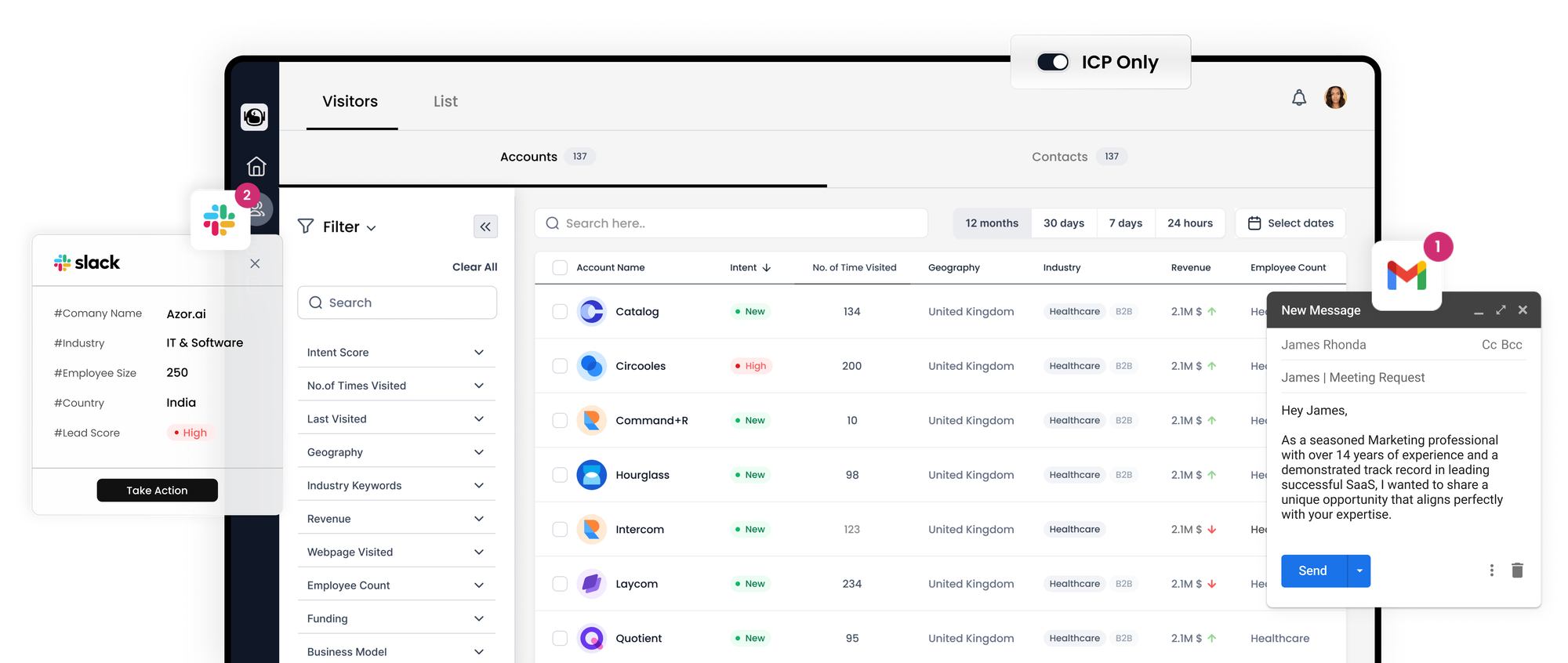Navigating the Evolving Landscape: Analyzing Key B2B Marketing Trends in 2023

Staying ahead of the curve in the dynamic world of B2B marketing requires a keen awareness of emerging trends. As we delve deeper into 2023, several transformative trends are shaping the B2B marketing landscape, revolutionizing how businesses connect, communicate, and collaborate. In this comprehensive exploration, we unravel these trends to equip companies with the insights needed to remain competitive, relevant, and successful in the evolving marketplace.

1. Personalization at Scale
Personalization at scale transcends the mere inclusion of a recipient's name in an email campaign. It's a sophisticated strategy centered on comprehending the unique requirements of each business within your portfolio and crafting tailored messages that resonate with their specific objectives, challenges, and industry intricacies.
This approach relies on the synergistic power of data analytics, artificial intelligence (AI), and automation tools:
- **Data Insights:** B2B marketers now have access to extensive datasets and advanced analytics tools that uncover invaluable insights about their clients. These insights, when combined with the capabilities of cold email outreach tools, enable the creation of highly personalized marketing messages tailored to each business's needs and aspirations.
- **AI and Machine Learning:** AI and Machine Learning play pivotal roles in identifying and predicting trends based on data patterns. They facilitate the delivery of personalized content at scale by automating tasks such as segmentation and content creation. This automation frees up resources for strategic planning, making personalization at scale an achievable goal.
The true paradigm shift lies in the marketing mindset itself. It involves viewing each client as a unique entity with distinct preferences and requirements. This nuanced understanding enables the creation of personalized buyer journeys that feel individualized and immersive, fostering deeper client relationships and driving enhanced conversion rates.
Successfully implementing personalization at scale can result in heightened customer engagement, loyalty, and ultimately, revenue growth. While substantial investments in technology and resources may be necessary, the benefits far outweigh the costs, positioning businesses with this capability at a distinct advantage.
2. Video Marketing Dominance
Visual storytelling has taken center stage, and video marketing has rapidly evolved from a complementary strategy to a dominant force in the B2B landscape. The power of video lies in its ability to distill complex information into engaging narratives, offering businesses the means to craft compelling stories that resonate with their audience.
What sets video marketing apart is its capacity to provide immersive experiences tailored to a viewer's specific interests and needs. Whether through product demonstrations, virtual tours, or customer testimonials, video enables businesses to construct narratives that drive engagement and cultivate lasting relationships with their audience.
However, the effectiveness of video marketing hinges on meticulous execution. Poorly executed videos can detract from a company's image and undermine its messaging. Therefore, quality production, strategic messaging, and creativity in content development become paramount factors in leveraging the full potential of video marketing.
3. Integration of AI and Automation
The increasing integration of artificial intelligence (AI) and automation into marketing processes is driving efficiency and unlocking new growth opportunities:
- **AI-Driven Insights:** AI tools excel in analyzing vast datasets and extracting actionable insights. They uncover patterns that human analysis might overlook, providing valuable guidance for marketing strategies.
- **Content Generation:** AI tools, including natural language generation (NLG), can generate various content types, such as social media posts, blog articles, and personalized marketing emails. This automation saves time and resources, enabling marketing teams to focus on strategy and planning.
- **Voice Search Optimization:** AI plays a pivotal role in optimizing content and marketing strategies for voice search. This includes understanding the nuances of spoken queries and delivering contextually appropriate responses.
- **Media Buying Automation:** AI automates the decision-making process in media buying, enabling precise targeting of specific audiences and demographics.
4. Focus on Sustainable and Ethical Marketing
Sustainable marketing involves adopting practices that minimize environmental impact, while ethical marketing emphasizes honesty and fairness in communication with customers, suppliers, and partners. A key aspect of these trends is transparency, ensuring that sustainability and ethics are not only claimed but also evident in business practices.
Alignment is another crucial element, as ethical and sustainable values should permeate all facets of a business, from supply chain management to employee relations. Practical manifestations of sustainable and ethical marketing include highlighting efforts to reduce carbon footprints, promoting products made with sustainable materials, and showcasing partnerships with fair-trade suppliers. Moreover, openly addressing past shortcomings and outlining improvement strategies can build credibility.
5. Voice Search Optimization
The proliferation of voice-activated devices like smart speakers and digital assistants has reshaped how customers seek information, offering businesses a transformative opportunity to enhance search engine visibility and customer engagement.
Voice search optimization involves adapting online presence, particularly websites and content, to be more accessible and discoverable through voice-activated searches. Voice searches are characterized by their conversational nature, with users posing context-rich questions rather than relying on keyword-based queries. Local context often plays a significant role in voice search, emphasizing the importance of local search engine optimization (SEO) practices.
Technical performance is critical for voice search optimization, with factors like speed, mobile-friendliness, and structured data influencing search engine rankings. Businesses that excel in these areas improve their chances of ranking higher in voice search results.
6. Account-Based Marketing (ABM) Expansion
Account-Based Marketing (ABM) continues to gain traction as B2B companies recognize its effectiveness in targeting high-value accounts. ABM directs marketing resources toward engaging specific target accounts, prioritizing tailored experiences over generalized strategies. To unlock the benefits of ABM, a plethora of account-based marketing software options are available.
7. Influencer Marketing in B2B
Influencer marketing, traditionally associated with B2C, is gaining prominence in B2B. Industry influencers and thought leaders are collaborating with B2B brands to endorse products and services, lending credibility and expanding reach within niche markets.
8. Data-Driven Decision Making
Data-driven decision making leverages data collection and analysis to inform marketing strategies. This approach ensures that decisions are grounded in evidence rather than intuition, enhancing the ability to predict outcomes, adjust strategies, and measure success. Collecting accurate, relevant data from sources like customer feedback, web analytics, social media engagement, and sales data enables businesses to better understand their audience, market dynamics, and the performance of past marketing initiatives. Detailed insights support precise customer segmentation, leading to more targeted marketing strategies and improved engagement, conversion rates, and customer retention.
9. Data Privacy and Security Measures
The increasing emphasis on data privacy and security in B2B marketing arises from growing client awareness and regulatory mandates. Clients demand transparency and assurance regarding data usage and safety. Businesses must acquaint themselves with relevant data regulations and provide regular employee training on data handling practices and security measures. Implementing encryption, secure data storage, robust network security, and regular audits are essential technical aspects of data security. Transparent data privacy policies that communicate data collection, usage, and storage practices enhance client trust and regulatory compliance.
How to Identify and Stay Informed About Market Trends: 6 Effective Strategies
In the ever-evolving world of marketing, staying ahead of the competition requires a proactive approach to spotting and capitalizing on emerging market trends. Here are six strategies to elevate your marketing game and distinguish your enterprise from the crowd:
1. Engage with Industry Thought Leaders
To gain a competitive edge, actively engage with prominent thought leaders in the marketing and analytics sphere. This entails following their blogs, tracking their social media channels, and participating in webinars where they share insights and make predictions about emerging trends. Thought leaders possess a unique ability to discern industry shifts, providing you with valuable information to keep your enterprise at the forefront of market developments.
2. Participate in Industry Events and Conferences
Regularly attending relevant industry events and conferences is a strategic move. These gatherings offer invaluable opportunities for networking, knowledge exchange with peers, and gaining insights into the latest advancements in B2B marketing. Not only can you learn about current trends during these events, but you can also contribute your own experiences and knowledge to the community.
3. Leverage Advanced Marketing Analytics Platforms
In today's digital age, data serves as the lifeblood of successful marketing strategies. Harnessing the power of advanced marketing analytics platforms is essential for comprehending market trends. These platforms enable you to analyze extensive datasets, uncover hidden patterns, track consumer behaviors, and identify emerging trends in the B2B sector. Armed with this comprehensive data, you can make well-informed decisions and fine-tune your marketing strategies to outshine your competitors.
4. Monitor Competitor Strategies
Keeping a vigilant eye on your competitors is another crucial aspect of staying well-informed about market trends. Thoroughly analyze their marketing campaigns, content strategies, and social media presence to gain insights into their tactics and achievements. While maintaining a focus on cultivating your unique approach, understanding what works for your competitors can inspire fresh ideas and enable you to adapt swiftly to market changes. The objective here is not to copy but to innovate and differentiate your enterprise effectively.
5. Invest in Continuous Learning and Skill Development
The landscape of B2B marketing is in a constant state of flux, driven by technological advancements and shifting consumer behaviors. Investing in your continuous learning and skill development is paramount. Attend workshops, enroll in online courses, and participate in webinars to stay updated on the latest marketing tools, methodologies, and trends.
6. Embrace Customer Feedback and Data Insights
Your customers hold a treasure trove of insights into market trends and preferences. Actively listen to customer feedback, conduct surveys, and analyze data from customer interactions to gain a deep understanding of their needs, pain points, and preferences. Embracing this feedback allows you to refine your marketing strategies and deliver personalized experiences, ultimately fostering stronger relationships with your B2B clients. By aligning your marketing efforts with customer insights, you position your enterprise to thrive in an increasingly customer-centric market.
Conclusion
Remaining at the forefront of B2B marketing trends is an ongoing journey. Engaging with thought leaders, leveraging advanced marketing analytics platforms, and actively participating in industry events will help you stay informed. The digital marketing trends for 2023 in the B2B landscape emphasize personalization, the dominance of video marketing, the integration of AI and automation, and a focus on sustainable and ethical marketing practices. By embracing these trends, your enterprise can seize opportunities and thrive in the dynamic world of B2B marketing.
